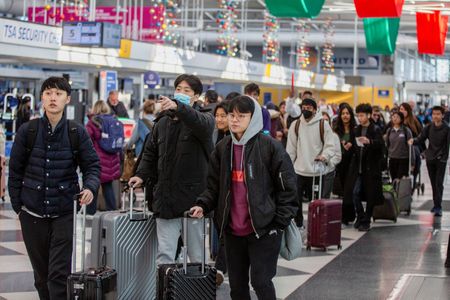By Doyinsola Oladipo and Rajesh Kumar Singh
NEW YORK/CHICAGO (Reuters) – U.S. airlines and airports are preparing for a surge in passengers over the Thanksgiving holiday, with the number of travelers expected to hit the highest level in three years.
Nearly 55 million Americans will take to the roads, skies and rails for the holiday, with air travel recovering to about 99% of the 2019 levels before the COVID-19 pandemic, travel group AAA estimates.
“I expect most flights to be running very full,” said John Grant, senior analyst at travel data firm OAG. “So finding a seat … might be quite difficult.”
Weary of coronavirus-related lockdowns, Americans are eager to travel more as the impact of the pandemic eases. However, staffing and aircraft shortages have capped the airline industry’s ability to ramp up capacity, resulting in fewer seats and higher fares for travelers.
Eric Fabricant, 38, of Connecticut, was flying on Monday from Newark International Airport to San Francisco for the holiday and his ticket cost him $800 compared with $250 two years ago.
“I’m always a little bit worried about delays because I don’t feel like the airlines are as reliable,” he said, citing concerns about exposure to COVID-19 on more crowded planes. “Knock on wood that works out.”
Thanksgiving Eve on Wednesday tends to be the busiest day for travel. However, the option to work remotely has allowed many Americans to stretch out their trips and avoid the last-day rush.
The new travel pattern is also expected to ease the pressure on airline operations, said Sharon Pinkerton, a senior vice president at Airlines for America (A4A), an industry trade group. Yet A4A and analysts are advising travelers to pack their patience and arrive early to allow extra time for security.
“We are delighted that (travel) demand is returning,” U.S. Transportation Secretary Pete Buttigieg said on Monday at an event at Chicago O’Hare Airport. “I would not say we’re out of the woods … But I am cautiously optimistic about this week being off to a good start.”
United Airlines expects to carry more than 5.5 million passengers from Nov. 18-30, nearly matching 2019 and up about 12% versus last year. It projects Nov. 27 as its busiest day since the onset of the pandemic.
Delta Air Lines Inc expects to fly close to 6 million customers this Thanksgiving holiday from Nov. 18-29, just shy of the total customers flown over the same period in 2019, the airline said.
Airlines are operating 13% fewer domestic flights during the eight-day Thanksgiving travel period compared with 2019, according to data by Cirium.
While flight delays and cancellations marred U.S. summer travel, airlines say they are better prepared to handle the holiday travel rush for Thanksgiving, which occurs on the fourth Thursday in November.
United said it is on track to hire 15,000 employees this year, while Delta said it has cut its schedule and increased boarding time. A4A estimates major carriers now have 10% more pilots than before the pandemic. Federal officials say they have enough staffing to handle holiday travel as well.
PAIN IN THE POCKET
Reduced flights and booming demand, meanwhile, have sent airline fares soaring. Domestic airfare for Thanksgiving is 17% higher than last year and in line with 2019 prices, according travel app Hopper. International airfare is 30% higher than in 2019.
There is also a rise in demand for less expensive travel options including buses and trains.
More than 1.4 million travelers are going out of town for Thanksgiving by bus, train or cruise ship, AAA estimates. That is an increase of 23% from 2021 and represents 96% of the 2019 volume.
The ratio between bus and train bookings has shifted from approximately 50/50 in 2021 to 65/35 in 2022, according to ground and air travel booking site Wanderu. “Buses have never been more competitive in the travel space as they are now,” intercity bus service FlixBus said in a statement to Reuters. The company this year received Thanksgiving travel bookings as early as June, three months earlier than in 2019.
(Reporting by Doyinsola Oladipo in New York, Rajesh Kumar Singh in Chicago and David Shepardson in Washington; Editing by Ben Klayman and Matthew Lewis)





